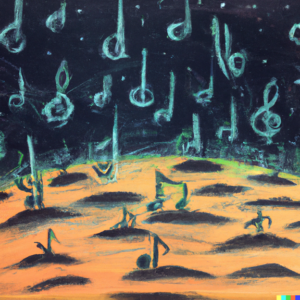
By: Greg Hartmann
My first year as a Humanities Alliance fellow was filled with a lot of new experiences. Rosalía, Sok, and I (the three fellows working at Guttman Community College) helped develop programs ranging from a “study hacks” presentation to bilingual poetry workshops to the creation of an annual common read on campus designed to facilitate discussions of race and identity. My fellowship experience has also influenced how I think about music. In the Spring of 2022, I curated and presented a series of lectures at the New York Public Library. Entitled “Deep Listening,” the series focused on identifying and celebrating diverse influences in works of music. For instance, Singaporean composer Cheng-Jin Koh discussed the fusion of Eastern and Western musical styles in her work, and American composer Bradley Harris talked about his influences, including Bartók, Progressive Rock, and the music of the black Pentecostal church.
Working at Guttman, I’ve engaged with a student body that was more racially and economically diverse than at any of the institutions with which I have been affiliated in the past. I am grateful that my interactions with students have irrevocably broadened my perspective. In particular, I have become more aware of the ways that privilege, race, and class influence our lives and have found that a discussion of almost any topic will be more complete if it addresses these forces.
An understanding of people and art of different backgrounds and cultures from our own can only help us to broaden our perspective and deepen our appreciation of those people and of art in general. Put another way, it is an incalculable loss if the paintings we admire, the literature we read, and the music we listen to systematically excludes creators of a certain group. Thus, it is incumbent on all of us—audience members, musicians, and concert presenters—to address the paucity of programming that includes works by underrepresented composers.
Unfortunately, the canonical “standard repertoire” of Western classical music does not represent diverse creators. Indeed, as Graduate Center Professor Phil Ewell has pointed out, there is a tendency to lionize white composers: “98.3% of the music that we teach from these seven [commonly-used American] textbooks is written by whites. This stark racial imbalance represents an unambiguous example of the white racial frame belief that the music of white persons represents the best framework for music theory. And if one were to count examples from Austro-German composers, one would surely see a clear example of the belief that music from German-speaking lands of the eighteenth, nineteenth, and early-twentieth centuries provides the best framework for music theory.”1 The representation of composers of color (and female composers) in the concert hall is similarly lacking.
The classical music world has only recently begun to grapple with these issues–Ewell’s article (and the presentation from which it derived) were a clarion call within the music theory community. Inspired by the realization of just how little music by underrepresented composers is programmed and performed, I started a commissioning project called the New Impromptu Project (www.newimpromptu.com). Supported by a grant from the Puffin Foundation, The New Impromptu Project seeks to uplift the voices of composers from backgrounds that are traditionally underrepresented in Western classical music concert programs.2 This project will commission four new works by four such composers. I look forward to bringing this project to fruition and performing and recording the four new works that the composers write!
1. Ewell, Phil, “Music Theory and the White Racial Frame”, Music Theory Online 26.2. https://mtosmt.org/issues/mto.20.26.2/mto.20.26.2.ewell.html
2. Here, “underrepresented” means people of color, women, and non-binary or transgender people.

